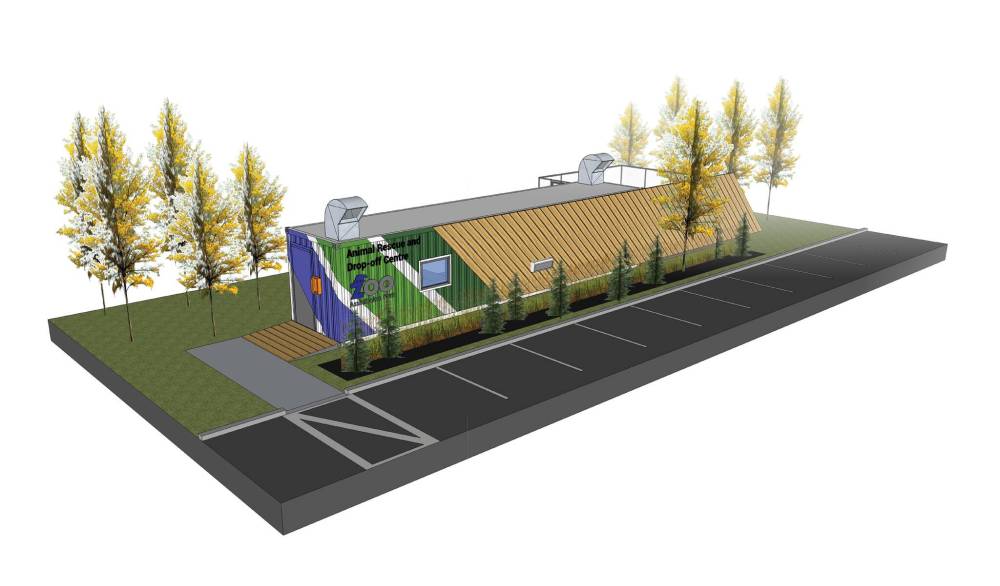MORE than 100 shipping containers used to visit vulnerable seniors during the height of the COVID-19 pandemic are now on their way to treat animals, make life easier for concertgoers and serve as homes for the less fortunate.
A total of 104 ‘external visitation shelters’ have been moved from long-term care centres and donated to not-for-profit organizations, First Nations and municipalities across Manitoba in the last year.
During the pandemic, the province spent $24 million to convert shipping containers into isolation units where seniors in care homes could visit with family members.

A concept rendering for the Assiniboine Park Zoo Wildlife Rescue and Drop-off Centre. (Supplied)
Now, recipients of the donated pods have been hard at work converting them for their individual needs.
The lion’s share of the shipping containers were sent to the Assiniboine Park Conservancy, which received 17 of them for animal care, vegetation and farming.
Conservancy spokeswoman Laura Cabak said one of the containers will be easy to see because it is being placed beside the Assiniboine Park Zoo parking lot on Corydon Avenue. It will serve as a place for volunteers from the Wildlife Haven Rehabilitation Centre to provide temporary care for wildlife before transferring them to the main facility in Île des Chênes.
Cabak said the other pods will support the zoo’s conservation programs and upgrade aging indoor animal holding facilities.
“The units used for conservation and animal care purposes will be in multiple locations throughout the zoo,” Cabak said.
“Some will be visitor facing, others will be behind the scenes … we have been working to advance the wildlife rescue project. We have engaged an engineering firm to produce more detailed plans for the retrofit and installation and are consulting with the City of Winnipeg regarding permitting requirements.”
At the Wildlife Haven Rehabilitation Centre, executive director Zoe Nakata said it is converting the four shipping containers into animal treatment spaces.
“One of them will be a triage pod for any animal coming in that shows signs of transmissible disease, including rabies and parvo,” Nakata said. “We will assess them in that pod.”
Nakata said previously, a tent was used inside the centre’s garage.
“Now, having this pod, which is fully functional and easy to keep clean, will be really beneficial to us. The other three will be quarantine pods, for animals with disease which can be treated, whether they are birds or mammals. They will get treatment and a safe place to heal.”
Meanwhile, on the east side of Lake Winnipeg, the Bloodvein First Nation awaits the 12 pods it will receive — the second largest number donated by the province — to be converted into single-person housing units. In total, five First Nations received 40 pods.
Band Coun. Ellen Young said they will be filled by community members as soon as they arrive in the community in the coming weeks.
“We had to get them renovated and we had to get funding to do that,” Young said.
“We secured some funding from (the Canada Mortgage and Housing Corporation) and we started. These bachelor apartments will be for some of our people who are homeless at this moment. We have a housing shortage here, but CMHC only lets us build houses for families.
“These pods mean 12 people won’t be couch surfing anymore in the community.”
Young said each unit will have a shower, toilet, utility room with a washer and dryer, a small kitchen and living room area, and a hide-a-bed.
“We are hoping to get four of them up here by the end of June.”
The Winnipeg Folk Festival applied for 20 shipping containers and received four. They are already using two of them at the festival location in Birds Hill Provincial Park as their site safety and administration trailers.
“These are units we normally would have to rent each year,” said Valerie Shantz, the festival’s executive director. “This also allows us to keep them all year round there so we don’t have to move them.
“This is a real help for us — and it saves us money.”
Shantz said the folk fest will use the two other pods to store merchandise and backstage supplies.
A provincial spokesman said in a statement “we are pleased to see these visitation pods, which were once a symbol of pain for so many Manitobans, have been given a new lease on life and now provide the 25 non-profit organizations who received them with much needed shelters.”
kevin.rollason@freepress.mb.ca

Kevin Rollason
Reporter
Kevin Rollason is one of the more versatile reporters at the Winnipeg Free Press. Whether it is covering city hall, the law courts, or general reporting, Rollason can be counted on to not only answer the 5 Ws — Who, What, When, Where and Why — but to do it in an interesting and accessible way for readers.
Our newsroom depends on a growing audience of readers to power our journalism. If you are not a paid reader, please consider becoming a subscriber.
Our newsroom depends on its audience of readers to power our journalism. Thank you for your support.